Danes Coffee: Global Marketing Management in the UK Market
VerifiedAdded on 2023/01/03
|15
|3605
|85
Report
AI Summary
This report analyzes the potential for Danes Coffee, an Australian specialty coffee producer, to enter the UK market. It begins with an executive summary and an introduction to Danes Coffee's background, highlighting its unique coffee blends and award-winning flavors. The report then delves into a comprehensive PESTLE analysis of the UK business environment, examining the political, economic, social, technological, legal, and environmental factors influencing the food and beverage sector, specifically the coffee industry. This includes an assessment of market size, consumer preferences, technological advancements, and relevant regulations. The report identifies key opportunities and threats for Danes Coffee in the UK market, considering the competitive landscape and evolving consumer trends. Finally, it concludes with strategic recommendations for Danes Coffee to successfully establish a niche market in the UK, addressing potential challenges and leveraging the identified opportunities for sustainable growth and market penetration. References are provided to support the analysis.
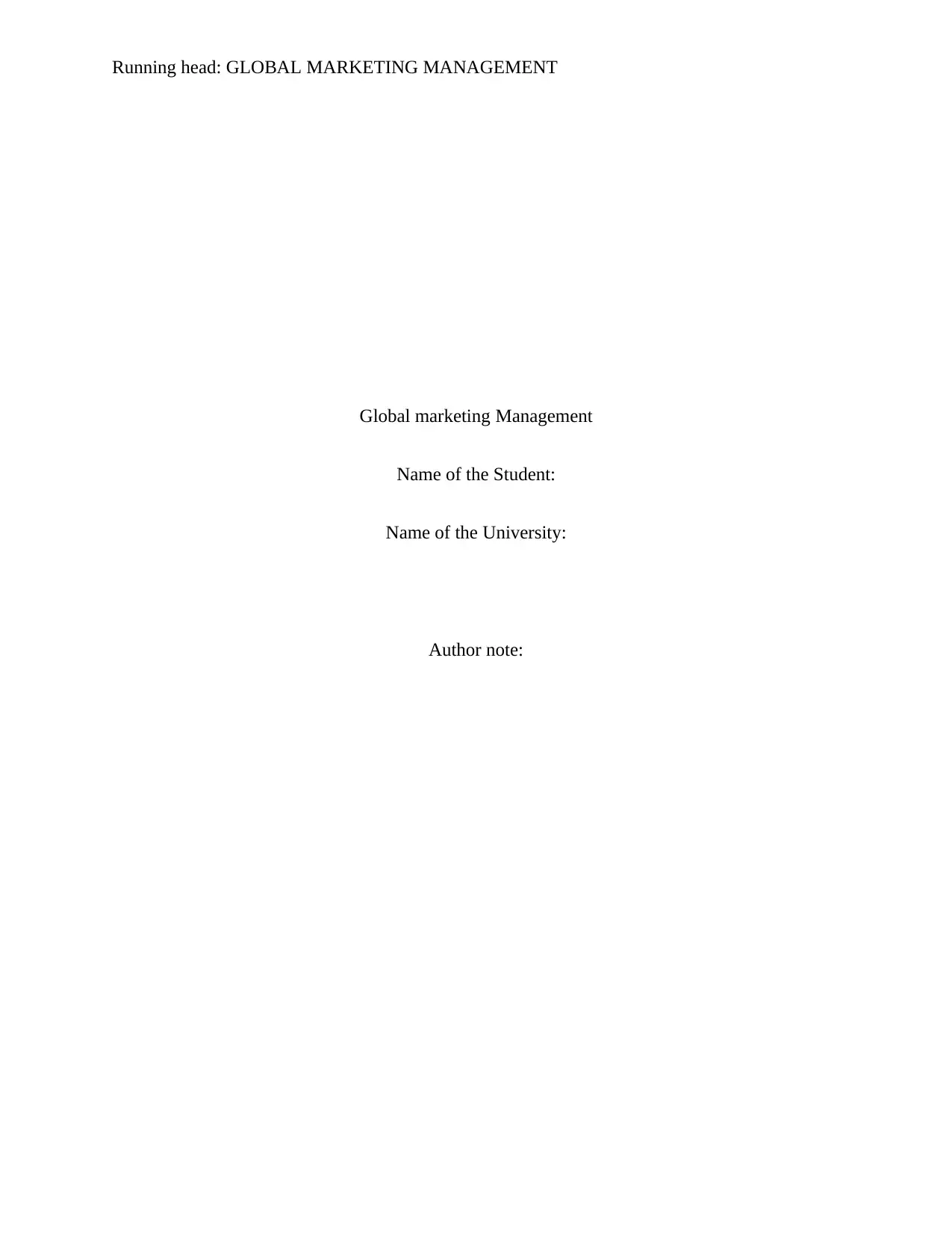
Running head: GLOBAL MARKETING MANAGEMENT
Global marketing Management
Name of the Student:
Name of the University:
Author note:
Global marketing Management
Name of the Student:
Name of the University:
Author note:
Paraphrase This Document
Need a fresh take? Get an instant paraphrase of this document with our AI Paraphraser
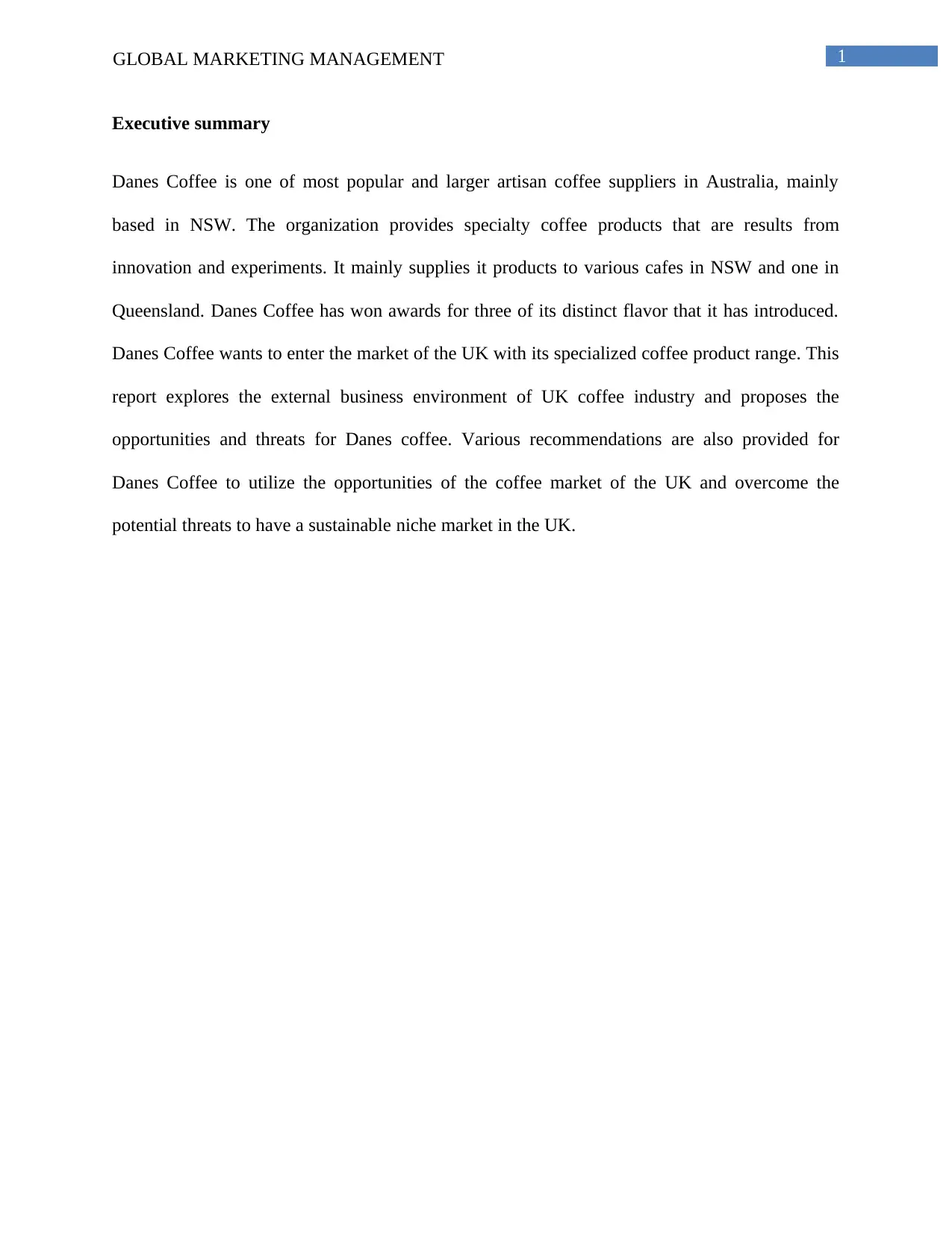
1GLOBAL MARKETING MANAGEMENT
Executive summary
Danes Coffee is one of most popular and larger artisan coffee suppliers in Australia, mainly
based in NSW. The organization provides specialty coffee products that are results from
innovation and experiments. It mainly supplies it products to various cafes in NSW and one in
Queensland. Danes Coffee has won awards for three of its distinct flavor that it has introduced.
Danes Coffee wants to enter the market of the UK with its specialized coffee product range. This
report explores the external business environment of UK coffee industry and proposes the
opportunities and threats for Danes coffee. Various recommendations are also provided for
Danes Coffee to utilize the opportunities of the coffee market of the UK and overcome the
potential threats to have a sustainable niche market in the UK.
Executive summary
Danes Coffee is one of most popular and larger artisan coffee suppliers in Australia, mainly
based in NSW. The organization provides specialty coffee products that are results from
innovation and experiments. It mainly supplies it products to various cafes in NSW and one in
Queensland. Danes Coffee has won awards for three of its distinct flavor that it has introduced.
Danes Coffee wants to enter the market of the UK with its specialized coffee product range. This
report explores the external business environment of UK coffee industry and proposes the
opportunities and threats for Danes coffee. Various recommendations are also provided for
Danes Coffee to utilize the opportunities of the coffee market of the UK and overcome the
potential threats to have a sustainable niche market in the UK.
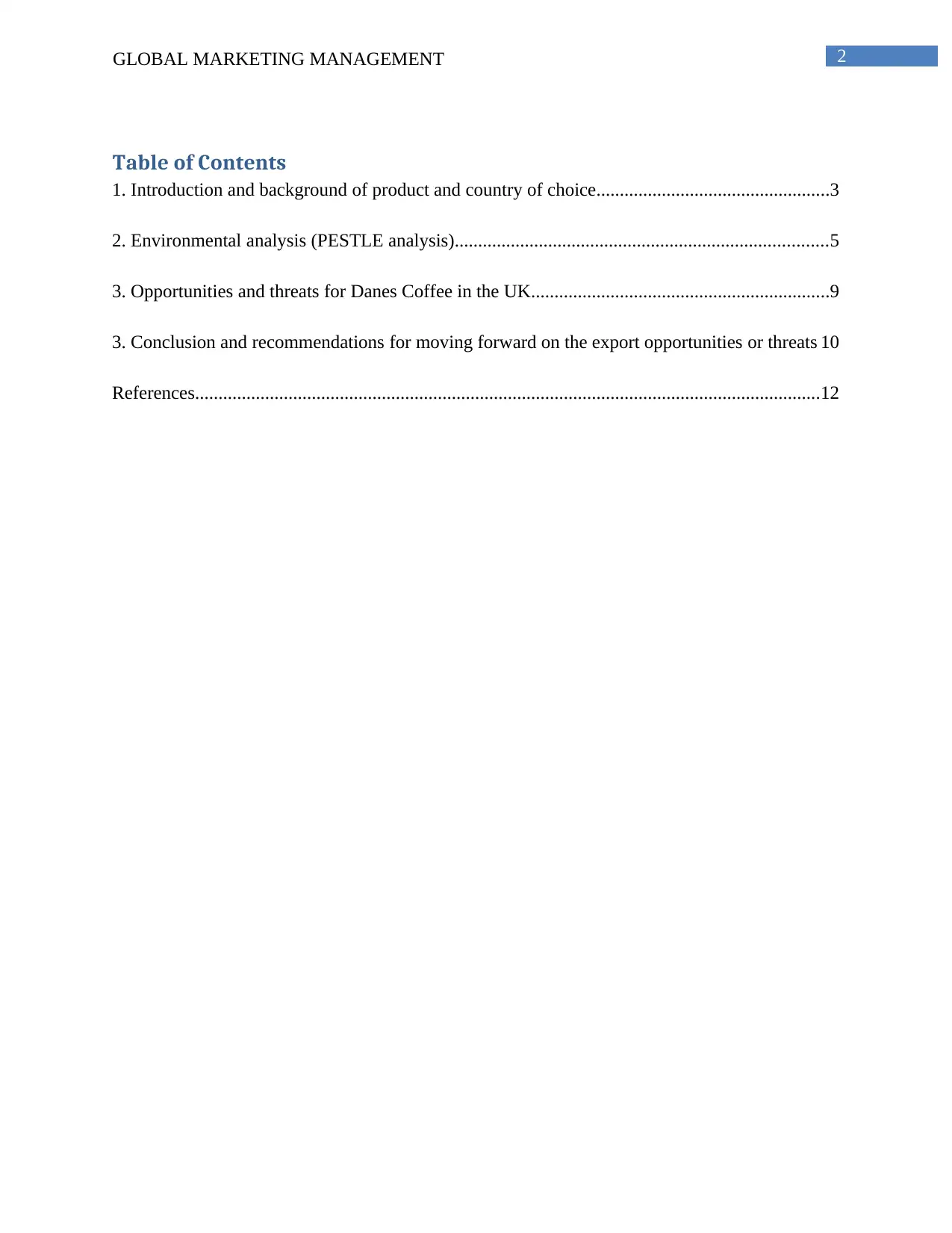
2GLOBAL MARKETING MANAGEMENT
Table of Contents
1. Introduction and background of product and country of choice..................................................3
2. Environmental analysis (PESTLE analysis)................................................................................5
3. Opportunities and threats for Danes Coffee in the UK................................................................9
3. Conclusion and recommendations for moving forward on the export opportunities or threats 10
References......................................................................................................................................12
Table of Contents
1. Introduction and background of product and country of choice..................................................3
2. Environmental analysis (PESTLE analysis)................................................................................5
3. Opportunities and threats for Danes Coffee in the UK................................................................9
3. Conclusion and recommendations for moving forward on the export opportunities or threats 10
References......................................................................................................................................12
⊘ This is a preview!⊘
Do you want full access?
Subscribe today to unlock all pages.

Trusted by 1+ million students worldwide
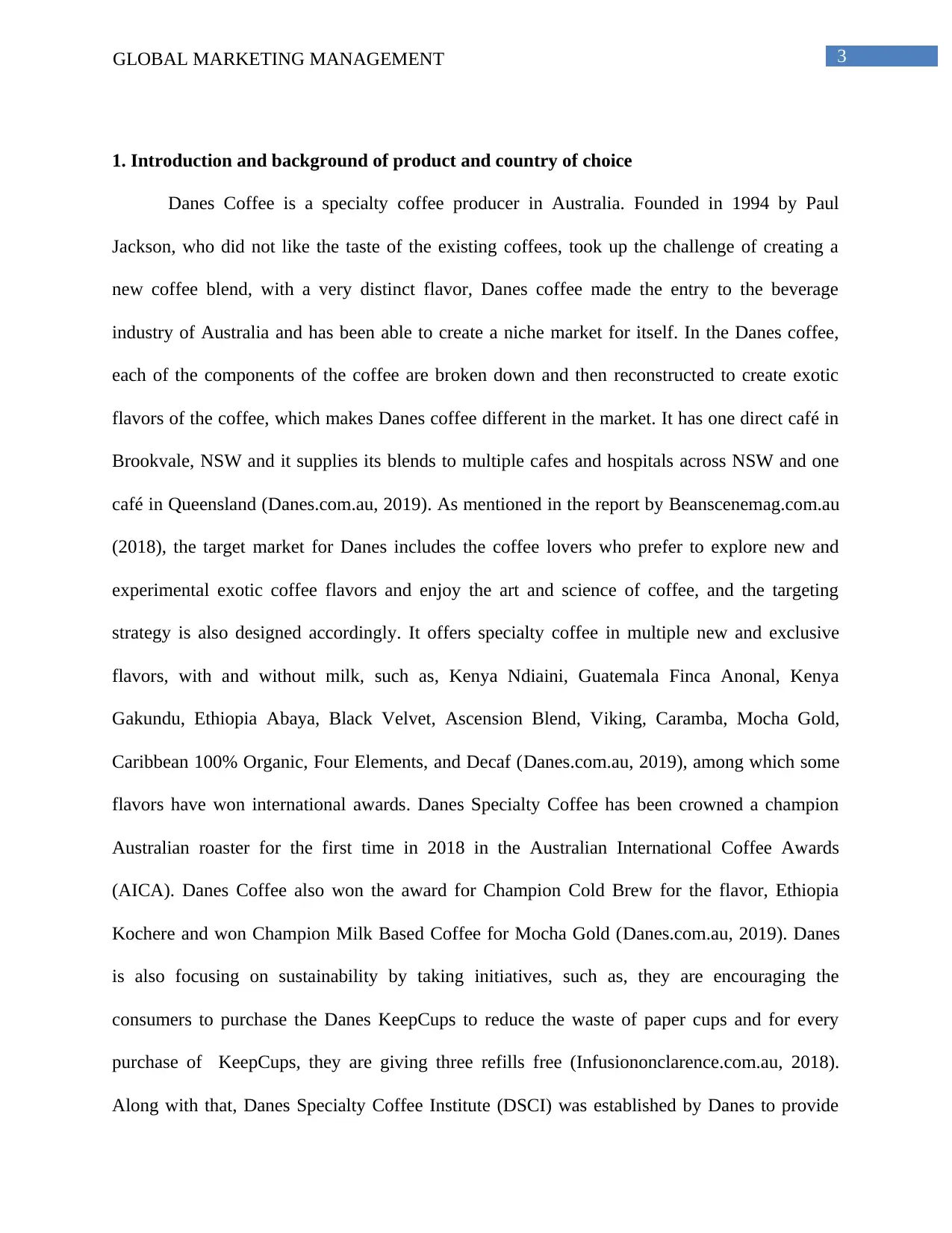
3GLOBAL MARKETING MANAGEMENT
1. Introduction and background of product and country of choice
Danes Coffee is a specialty coffee producer in Australia. Founded in 1994 by Paul
Jackson, who did not like the taste of the existing coffees, took up the challenge of creating a
new coffee blend, with a very distinct flavor, Danes coffee made the entry to the beverage
industry of Australia and has been able to create a niche market for itself. In the Danes coffee,
each of the components of the coffee are broken down and then reconstructed to create exotic
flavors of the coffee, which makes Danes coffee different in the market. It has one direct café in
Brookvale, NSW and it supplies its blends to multiple cafes and hospitals across NSW and one
café in Queensland (Danes.com.au, 2019). As mentioned in the report by Beanscenemag.com.au
(2018), the target market for Danes includes the coffee lovers who prefer to explore new and
experimental exotic coffee flavors and enjoy the art and science of coffee, and the targeting
strategy is also designed accordingly. It offers specialty coffee in multiple new and exclusive
flavors, with and without milk, such as, Kenya Ndiaini, Guatemala Finca Anonal, Kenya
Gakundu, Ethiopia Abaya, Black Velvet, Ascension Blend, Viking, Caramba, Mocha Gold,
Caribbean 100% Organic, Four Elements, and Decaf (Danes.com.au, 2019), among which some
flavors have won international awards. Danes Specialty Coffee has been crowned a champion
Australian roaster for the first time in 2018 in the Australian International Coffee Awards
(AICA). Danes Coffee also won the award for Champion Cold Brew for the flavor, Ethiopia
Kochere and won Champion Milk Based Coffee for Mocha Gold (Danes.com.au, 2019). Danes
is also focusing on sustainability by taking initiatives, such as, they are encouraging the
consumers to purchase the Danes KeepCups to reduce the waste of paper cups and for every
purchase of KeepCups, they are giving three refills free (Infusiononclarence.com.au, 2018).
Along with that, Danes Specialty Coffee Institute (DSCI) was established by Danes to provide
1. Introduction and background of product and country of choice
Danes Coffee is a specialty coffee producer in Australia. Founded in 1994 by Paul
Jackson, who did not like the taste of the existing coffees, took up the challenge of creating a
new coffee blend, with a very distinct flavor, Danes coffee made the entry to the beverage
industry of Australia and has been able to create a niche market for itself. In the Danes coffee,
each of the components of the coffee are broken down and then reconstructed to create exotic
flavors of the coffee, which makes Danes coffee different in the market. It has one direct café in
Brookvale, NSW and it supplies its blends to multiple cafes and hospitals across NSW and one
café in Queensland (Danes.com.au, 2019). As mentioned in the report by Beanscenemag.com.au
(2018), the target market for Danes includes the coffee lovers who prefer to explore new and
experimental exotic coffee flavors and enjoy the art and science of coffee, and the targeting
strategy is also designed accordingly. It offers specialty coffee in multiple new and exclusive
flavors, with and without milk, such as, Kenya Ndiaini, Guatemala Finca Anonal, Kenya
Gakundu, Ethiopia Abaya, Black Velvet, Ascension Blend, Viking, Caramba, Mocha Gold,
Caribbean 100% Organic, Four Elements, and Decaf (Danes.com.au, 2019), among which some
flavors have won international awards. Danes Specialty Coffee has been crowned a champion
Australian roaster for the first time in 2018 in the Australian International Coffee Awards
(AICA). Danes Coffee also won the award for Champion Cold Brew for the flavor, Ethiopia
Kochere and won Champion Milk Based Coffee for Mocha Gold (Danes.com.au, 2019). Danes
is also focusing on sustainability by taking initiatives, such as, they are encouraging the
consumers to purchase the Danes KeepCups to reduce the waste of paper cups and for every
purchase of KeepCups, they are giving three refills free (Infusiononclarence.com.au, 2018).
Along with that, Danes Specialty Coffee Institute (DSCI) was established by Danes to provide
Paraphrase This Document
Need a fresh take? Get an instant paraphrase of this document with our AI Paraphraser
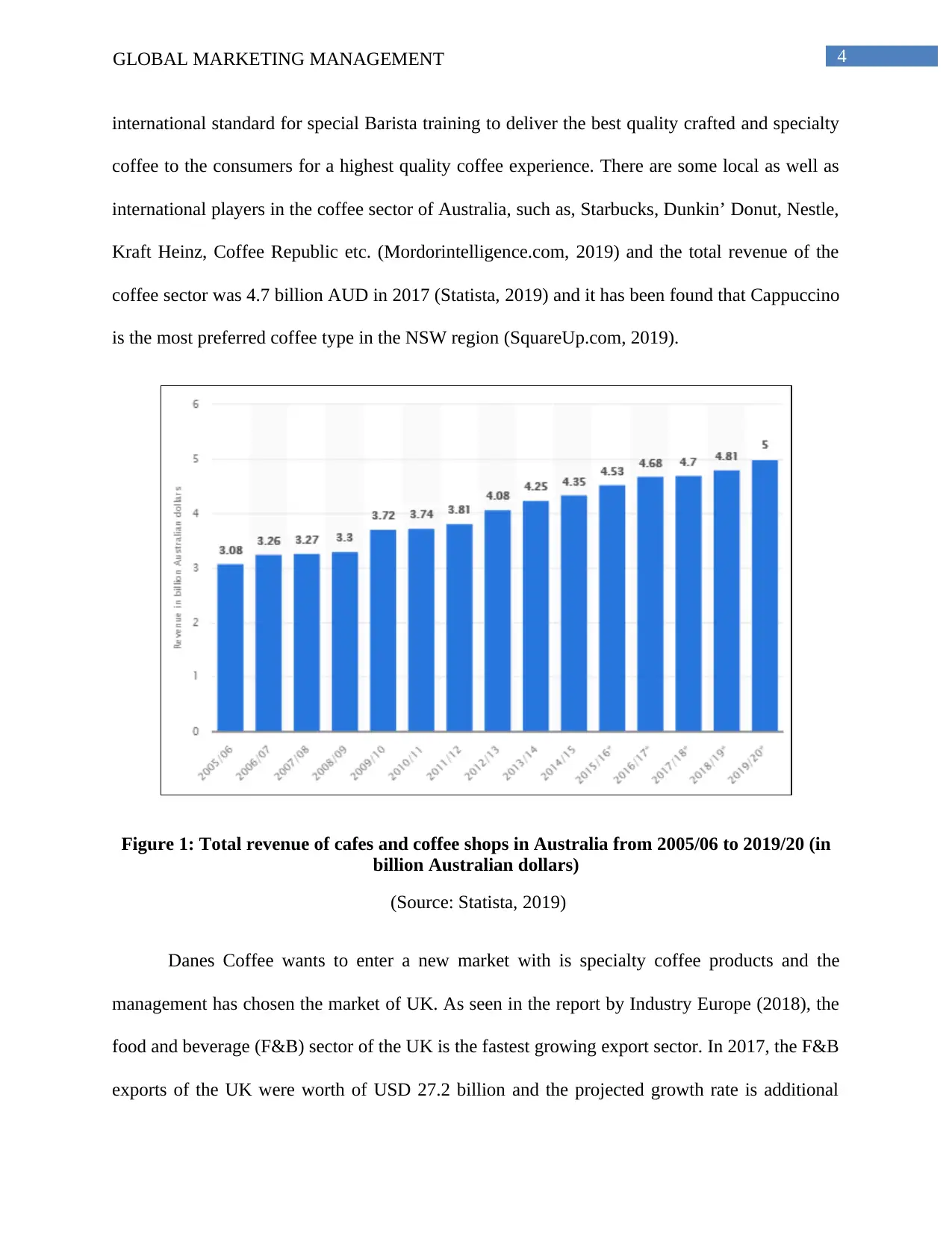
4GLOBAL MARKETING MANAGEMENT
international standard for special Barista training to deliver the best quality crafted and specialty
coffee to the consumers for a highest quality coffee experience. There are some local as well as
international players in the coffee sector of Australia, such as, Starbucks, Dunkin’ Donut, Nestle,
Kraft Heinz, Coffee Republic etc. (Mordorintelligence.com, 2019) and the total revenue of the
coffee sector was 4.7 billion AUD in 2017 (Statista, 2019) and it has been found that Cappuccino
is the most preferred coffee type in the NSW region (SquareUp.com, 2019).
Figure 1: Total revenue of cafes and coffee shops in Australia from 2005/06 to 2019/20 (in
billion Australian dollars)
(Source: Statista, 2019)
Danes Coffee wants to enter a new market with is specialty coffee products and the
management has chosen the market of UK. As seen in the report by Industry Europe (2018), the
food and beverage (F&B) sector of the UK is the fastest growing export sector. In 2017, the F&B
exports of the UK were worth of USD 27.2 billion and the projected growth rate is additional
international standard for special Barista training to deliver the best quality crafted and specialty
coffee to the consumers for a highest quality coffee experience. There are some local as well as
international players in the coffee sector of Australia, such as, Starbucks, Dunkin’ Donut, Nestle,
Kraft Heinz, Coffee Republic etc. (Mordorintelligence.com, 2019) and the total revenue of the
coffee sector was 4.7 billion AUD in 2017 (Statista, 2019) and it has been found that Cappuccino
is the most preferred coffee type in the NSW region (SquareUp.com, 2019).
Figure 1: Total revenue of cafes and coffee shops in Australia from 2005/06 to 2019/20 (in
billion Australian dollars)
(Source: Statista, 2019)
Danes Coffee wants to enter a new market with is specialty coffee products and the
management has chosen the market of UK. As seen in the report by Industry Europe (2018), the
food and beverage (F&B) sector of the UK is the fastest growing export sector. In 2017, the F&B
exports of the UK were worth of USD 27.2 billion and the projected growth rate is additional
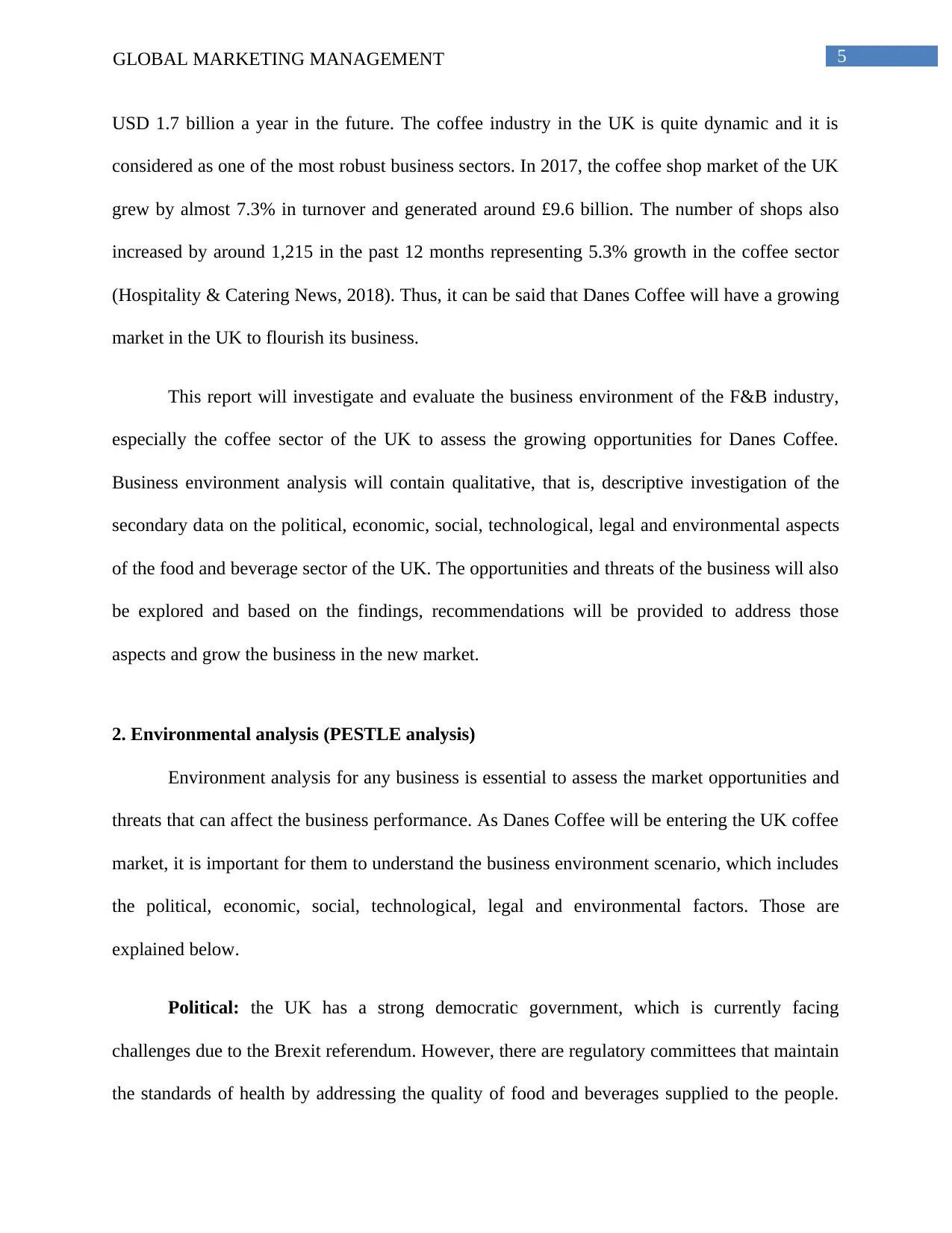
5GLOBAL MARKETING MANAGEMENT
USD 1.7 billion a year in the future. The coffee industry in the UK is quite dynamic and it is
considered as one of the most robust business sectors. In 2017, the coffee shop market of the UK
grew by almost 7.3% in turnover and generated around £9.6 billion. The number of shops also
increased by around 1,215 in the past 12 months representing 5.3% growth in the coffee sector
(Hospitality & Catering News, 2018). Thus, it can be said that Danes Coffee will have a growing
market in the UK to flourish its business.
This report will investigate and evaluate the business environment of the F&B industry,
especially the coffee sector of the UK to assess the growing opportunities for Danes Coffee.
Business environment analysis will contain qualitative, that is, descriptive investigation of the
secondary data on the political, economic, social, technological, legal and environmental aspects
of the food and beverage sector of the UK. The opportunities and threats of the business will also
be explored and based on the findings, recommendations will be provided to address those
aspects and grow the business in the new market.
2. Environmental analysis (PESTLE analysis)
Environment analysis for any business is essential to assess the market opportunities and
threats that can affect the business performance. As Danes Coffee will be entering the UK coffee
market, it is important for them to understand the business environment scenario, which includes
the political, economic, social, technological, legal and environmental factors. Those are
explained below.
Political: the UK has a strong democratic government, which is currently facing
challenges due to the Brexit referendum. However, there are regulatory committees that maintain
the standards of health by addressing the quality of food and beverages supplied to the people.
USD 1.7 billion a year in the future. The coffee industry in the UK is quite dynamic and it is
considered as one of the most robust business sectors. In 2017, the coffee shop market of the UK
grew by almost 7.3% in turnover and generated around £9.6 billion. The number of shops also
increased by around 1,215 in the past 12 months representing 5.3% growth in the coffee sector
(Hospitality & Catering News, 2018). Thus, it can be said that Danes Coffee will have a growing
market in the UK to flourish its business.
This report will investigate and evaluate the business environment of the F&B industry,
especially the coffee sector of the UK to assess the growing opportunities for Danes Coffee.
Business environment analysis will contain qualitative, that is, descriptive investigation of the
secondary data on the political, economic, social, technological, legal and environmental aspects
of the food and beverage sector of the UK. The opportunities and threats of the business will also
be explored and based on the findings, recommendations will be provided to address those
aspects and grow the business in the new market.
2. Environmental analysis (PESTLE analysis)
Environment analysis for any business is essential to assess the market opportunities and
threats that can affect the business performance. As Danes Coffee will be entering the UK coffee
market, it is important for them to understand the business environment scenario, which includes
the political, economic, social, technological, legal and environmental factors. Those are
explained below.
Political: the UK has a strong democratic government, which is currently facing
challenges due to the Brexit referendum. However, there are regulatory committees that maintain
the standards of health by addressing the quality of food and beverages supplied to the people.
⊘ This is a preview!⊘
Do you want full access?
Subscribe today to unlock all pages.

Trusted by 1+ million students worldwide
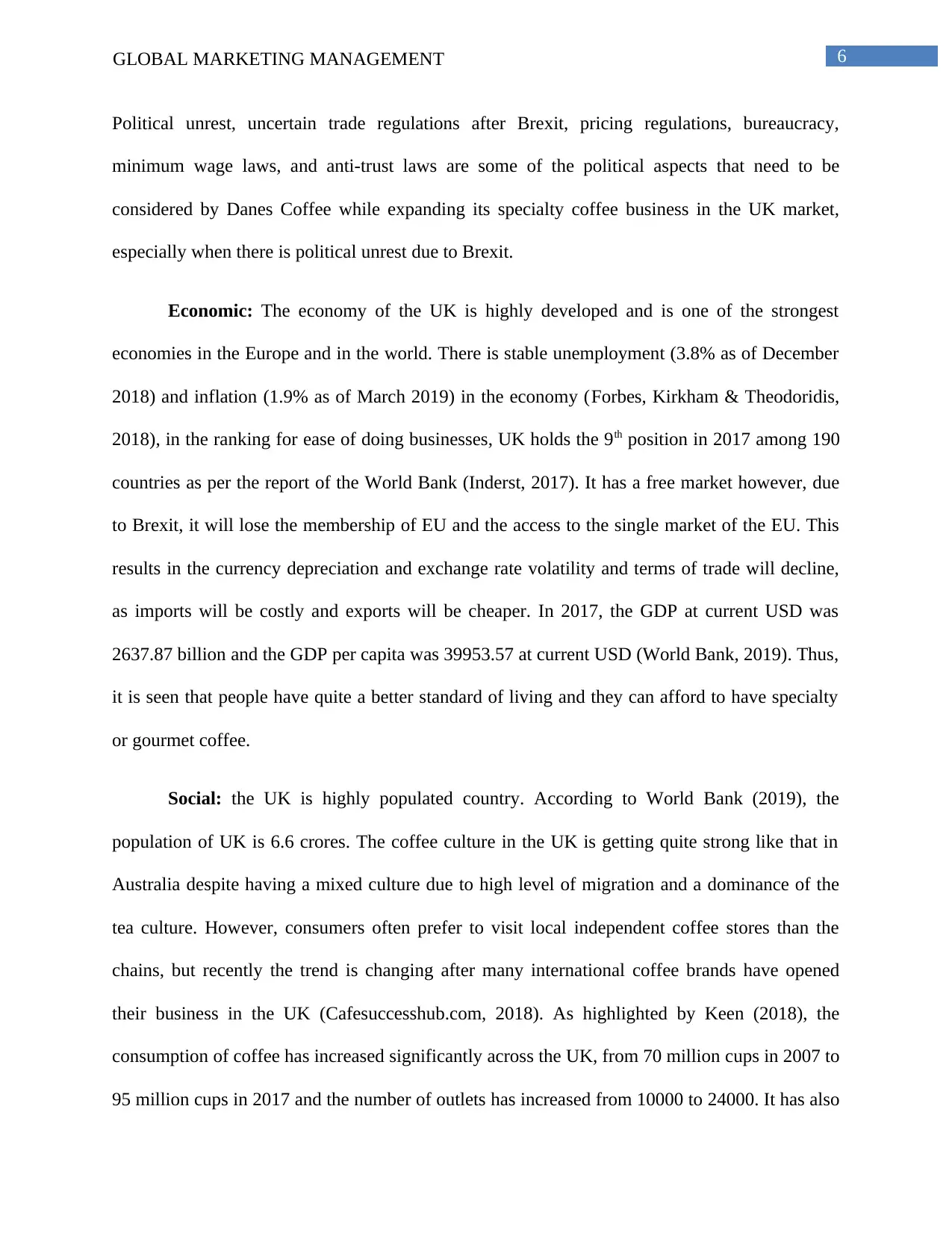
6GLOBAL MARKETING MANAGEMENT
Political unrest, uncertain trade regulations after Brexit, pricing regulations, bureaucracy,
minimum wage laws, and anti-trust laws are some of the political aspects that need to be
considered by Danes Coffee while expanding its specialty coffee business in the UK market,
especially when there is political unrest due to Brexit.
Economic: The economy of the UK is highly developed and is one of the strongest
economies in the Europe and in the world. There is stable unemployment (3.8% as of December
2018) and inflation (1.9% as of March 2019) in the economy (Forbes, Kirkham & Theodoridis,
2018), in the ranking for ease of doing businesses, UK holds the 9th position in 2017 among 190
countries as per the report of the World Bank (Inderst, 2017). It has a free market however, due
to Brexit, it will lose the membership of EU and the access to the single market of the EU. This
results in the currency depreciation and exchange rate volatility and terms of trade will decline,
as imports will be costly and exports will be cheaper. In 2017, the GDP at current USD was
2637.87 billion and the GDP per capita was 39953.57 at current USD (World Bank, 2019). Thus,
it is seen that people have quite a better standard of living and they can afford to have specialty
or gourmet coffee.
Social: the UK is highly populated country. According to World Bank (2019), the
population of UK is 6.6 crores. The coffee culture in the UK is getting quite strong like that in
Australia despite having a mixed culture due to high level of migration and a dominance of the
tea culture. However, consumers often prefer to visit local independent coffee stores than the
chains, but recently the trend is changing after many international coffee brands have opened
their business in the UK (Cafesuccesshub.com, 2018). As highlighted by Keen (2018), the
consumption of coffee has increased significantly across the UK, from 70 million cups in 2007 to
95 million cups in 2017 and the number of outlets has increased from 10000 to 24000. It has also
Political unrest, uncertain trade regulations after Brexit, pricing regulations, bureaucracy,
minimum wage laws, and anti-trust laws are some of the political aspects that need to be
considered by Danes Coffee while expanding its specialty coffee business in the UK market,
especially when there is political unrest due to Brexit.
Economic: The economy of the UK is highly developed and is one of the strongest
economies in the Europe and in the world. There is stable unemployment (3.8% as of December
2018) and inflation (1.9% as of March 2019) in the economy (Forbes, Kirkham & Theodoridis,
2018), in the ranking for ease of doing businesses, UK holds the 9th position in 2017 among 190
countries as per the report of the World Bank (Inderst, 2017). It has a free market however, due
to Brexit, it will lose the membership of EU and the access to the single market of the EU. This
results in the currency depreciation and exchange rate volatility and terms of trade will decline,
as imports will be costly and exports will be cheaper. In 2017, the GDP at current USD was
2637.87 billion and the GDP per capita was 39953.57 at current USD (World Bank, 2019). Thus,
it is seen that people have quite a better standard of living and they can afford to have specialty
or gourmet coffee.
Social: the UK is highly populated country. According to World Bank (2019), the
population of UK is 6.6 crores. The coffee culture in the UK is getting quite strong like that in
Australia despite having a mixed culture due to high level of migration and a dominance of the
tea culture. However, consumers often prefer to visit local independent coffee stores than the
chains, but recently the trend is changing after many international coffee brands have opened
their business in the UK (Cafesuccesshub.com, 2018). As highlighted by Keen (2018), the
consumption of coffee has increased significantly across the UK, from 70 million cups in 2007 to
95 million cups in 2017 and the number of outlets has increased from 10000 to 24000. It has also
Paraphrase This Document
Need a fresh take? Get an instant paraphrase of this document with our AI Paraphraser
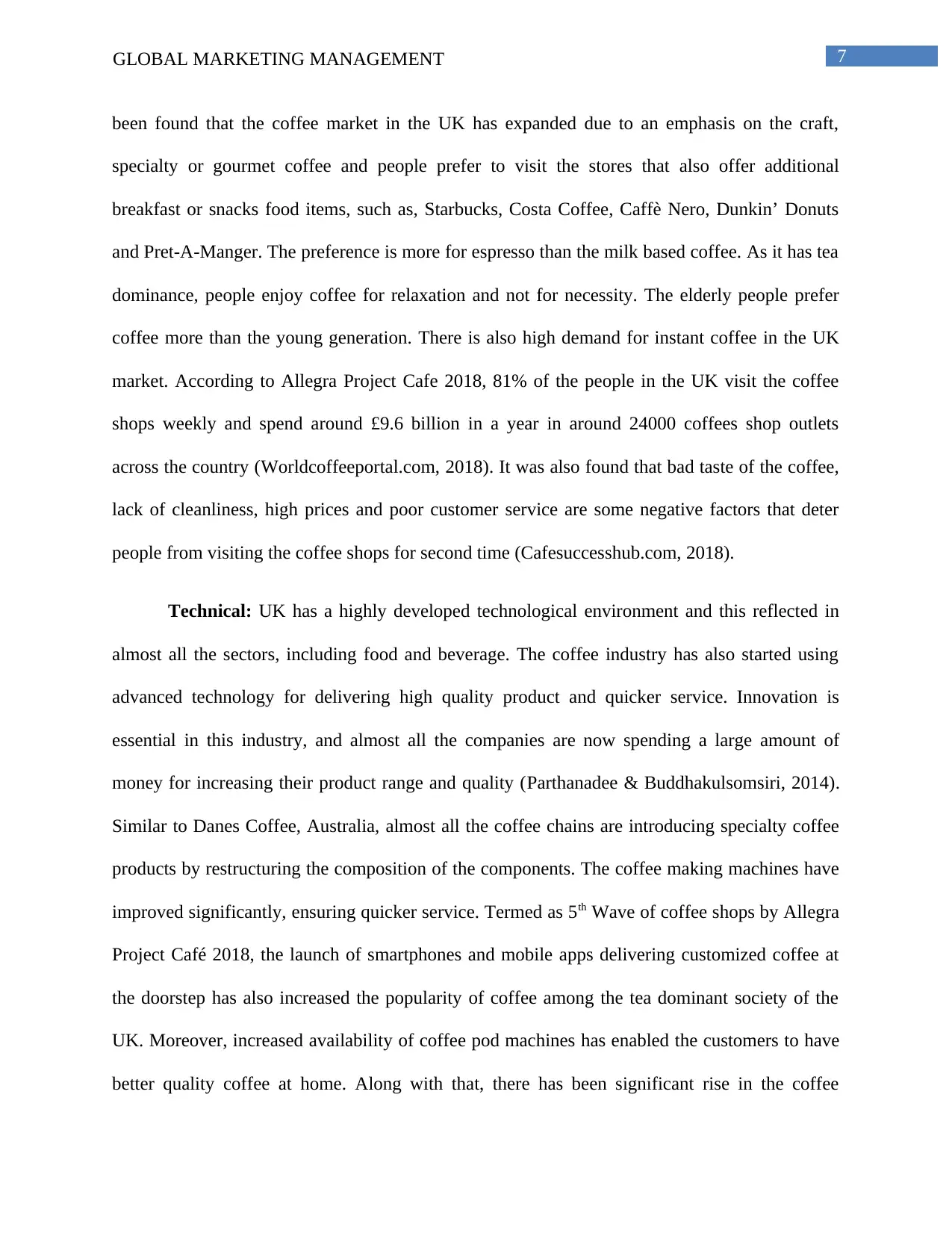
7GLOBAL MARKETING MANAGEMENT
been found that the coffee market in the UK has expanded due to an emphasis on the craft,
specialty or gourmet coffee and people prefer to visit the stores that also offer additional
breakfast or snacks food items, such as, Starbucks, Costa Coffee, Caffè Nero, Dunkin’ Donuts
and Pret-A-Manger. The preference is more for espresso than the milk based coffee. As it has tea
dominance, people enjoy coffee for relaxation and not for necessity. The elderly people prefer
coffee more than the young generation. There is also high demand for instant coffee in the UK
market. According to Allegra Project Cafe 2018, 81% of the people in the UK visit the coffee
shops weekly and spend around £9.6 billion in a year in around 24000 coffees shop outlets
across the country (Worldcoffeeportal.com, 2018). It was also found that bad taste of the coffee,
lack of cleanliness, high prices and poor customer service are some negative factors that deter
people from visiting the coffee shops for second time (Cafesuccesshub.com, 2018).
Technical: UK has a highly developed technological environment and this reflected in
almost all the sectors, including food and beverage. The coffee industry has also started using
advanced technology for delivering high quality product and quicker service. Innovation is
essential in this industry, and almost all the companies are now spending a large amount of
money for increasing their product range and quality (Parthanadee & Buddhakulsomsiri, 2014).
Similar to Danes Coffee, Australia, almost all the coffee chains are introducing specialty coffee
products by restructuring the composition of the components. The coffee making machines have
improved significantly, ensuring quicker service. Termed as 5th Wave of coffee shops by Allegra
Project Café 2018, the launch of smartphones and mobile apps delivering customized coffee at
the doorstep has also increased the popularity of coffee among the tea dominant society of the
UK. Moreover, increased availability of coffee pod machines has enabled the customers to have
better quality coffee at home. Along with that, there has been significant rise in the coffee
been found that the coffee market in the UK has expanded due to an emphasis on the craft,
specialty or gourmet coffee and people prefer to visit the stores that also offer additional
breakfast or snacks food items, such as, Starbucks, Costa Coffee, Caffè Nero, Dunkin’ Donuts
and Pret-A-Manger. The preference is more for espresso than the milk based coffee. As it has tea
dominance, people enjoy coffee for relaxation and not for necessity. The elderly people prefer
coffee more than the young generation. There is also high demand for instant coffee in the UK
market. According to Allegra Project Cafe 2018, 81% of the people in the UK visit the coffee
shops weekly and spend around £9.6 billion in a year in around 24000 coffees shop outlets
across the country (Worldcoffeeportal.com, 2018). It was also found that bad taste of the coffee,
lack of cleanliness, high prices and poor customer service are some negative factors that deter
people from visiting the coffee shops for second time (Cafesuccesshub.com, 2018).
Technical: UK has a highly developed technological environment and this reflected in
almost all the sectors, including food and beverage. The coffee industry has also started using
advanced technology for delivering high quality product and quicker service. Innovation is
essential in this industry, and almost all the companies are now spending a large amount of
money for increasing their product range and quality (Parthanadee & Buddhakulsomsiri, 2014).
Similar to Danes Coffee, Australia, almost all the coffee chains are introducing specialty coffee
products by restructuring the composition of the components. The coffee making machines have
improved significantly, ensuring quicker service. Termed as 5th Wave of coffee shops by Allegra
Project Café 2018, the launch of smartphones and mobile apps delivering customized coffee at
the doorstep has also increased the popularity of coffee among the tea dominant society of the
UK. Moreover, increased availability of coffee pod machines has enabled the customers to have
better quality coffee at home. Along with that, there has been significant rise in the coffee
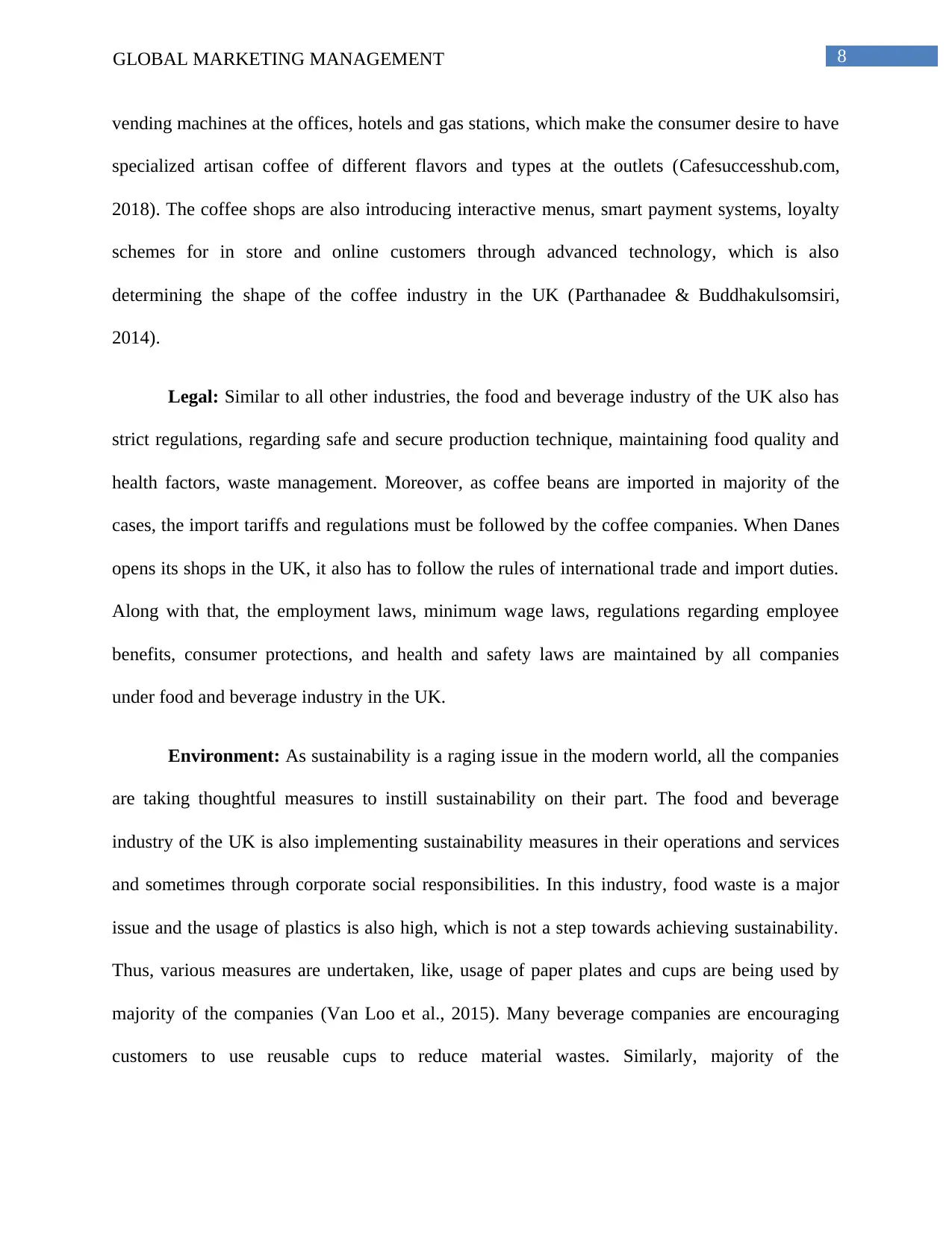
8GLOBAL MARKETING MANAGEMENT
vending machines at the offices, hotels and gas stations, which make the consumer desire to have
specialized artisan coffee of different flavors and types at the outlets (Cafesuccesshub.com,
2018). The coffee shops are also introducing interactive menus, smart payment systems, loyalty
schemes for in store and online customers through advanced technology, which is also
determining the shape of the coffee industry in the UK (Parthanadee & Buddhakulsomsiri,
2014).
Legal: Similar to all other industries, the food and beverage industry of the UK also has
strict regulations, regarding safe and secure production technique, maintaining food quality and
health factors, waste management. Moreover, as coffee beans are imported in majority of the
cases, the import tariffs and regulations must be followed by the coffee companies. When Danes
opens its shops in the UK, it also has to follow the rules of international trade and import duties.
Along with that, the employment laws, minimum wage laws, regulations regarding employee
benefits, consumer protections, and health and safety laws are maintained by all companies
under food and beverage industry in the UK.
Environment: As sustainability is a raging issue in the modern world, all the companies
are taking thoughtful measures to instill sustainability on their part. The food and beverage
industry of the UK is also implementing sustainability measures in their operations and services
and sometimes through corporate social responsibilities. In this industry, food waste is a major
issue and the usage of plastics is also high, which is not a step towards achieving sustainability.
Thus, various measures are undertaken, like, usage of paper plates and cups are being used by
majority of the companies (Van Loo et al., 2015). Many beverage companies are encouraging
customers to use reusable cups to reduce material wastes. Similarly, majority of the
vending machines at the offices, hotels and gas stations, which make the consumer desire to have
specialized artisan coffee of different flavors and types at the outlets (Cafesuccesshub.com,
2018). The coffee shops are also introducing interactive menus, smart payment systems, loyalty
schemes for in store and online customers through advanced technology, which is also
determining the shape of the coffee industry in the UK (Parthanadee & Buddhakulsomsiri,
2014).
Legal: Similar to all other industries, the food and beverage industry of the UK also has
strict regulations, regarding safe and secure production technique, maintaining food quality and
health factors, waste management. Moreover, as coffee beans are imported in majority of the
cases, the import tariffs and regulations must be followed by the coffee companies. When Danes
opens its shops in the UK, it also has to follow the rules of international trade and import duties.
Along with that, the employment laws, minimum wage laws, regulations regarding employee
benefits, consumer protections, and health and safety laws are maintained by all companies
under food and beverage industry in the UK.
Environment: As sustainability is a raging issue in the modern world, all the companies
are taking thoughtful measures to instill sustainability on their part. The food and beverage
industry of the UK is also implementing sustainability measures in their operations and services
and sometimes through corporate social responsibilities. In this industry, food waste is a major
issue and the usage of plastics is also high, which is not a step towards achieving sustainability.
Thus, various measures are undertaken, like, usage of paper plates and cups are being used by
majority of the companies (Van Loo et al., 2015). Many beverage companies are encouraging
customers to use reusable cups to reduce material wastes. Similarly, majority of the
⊘ This is a preview!⊘
Do you want full access?
Subscribe today to unlock all pages.

Trusted by 1+ million students worldwide
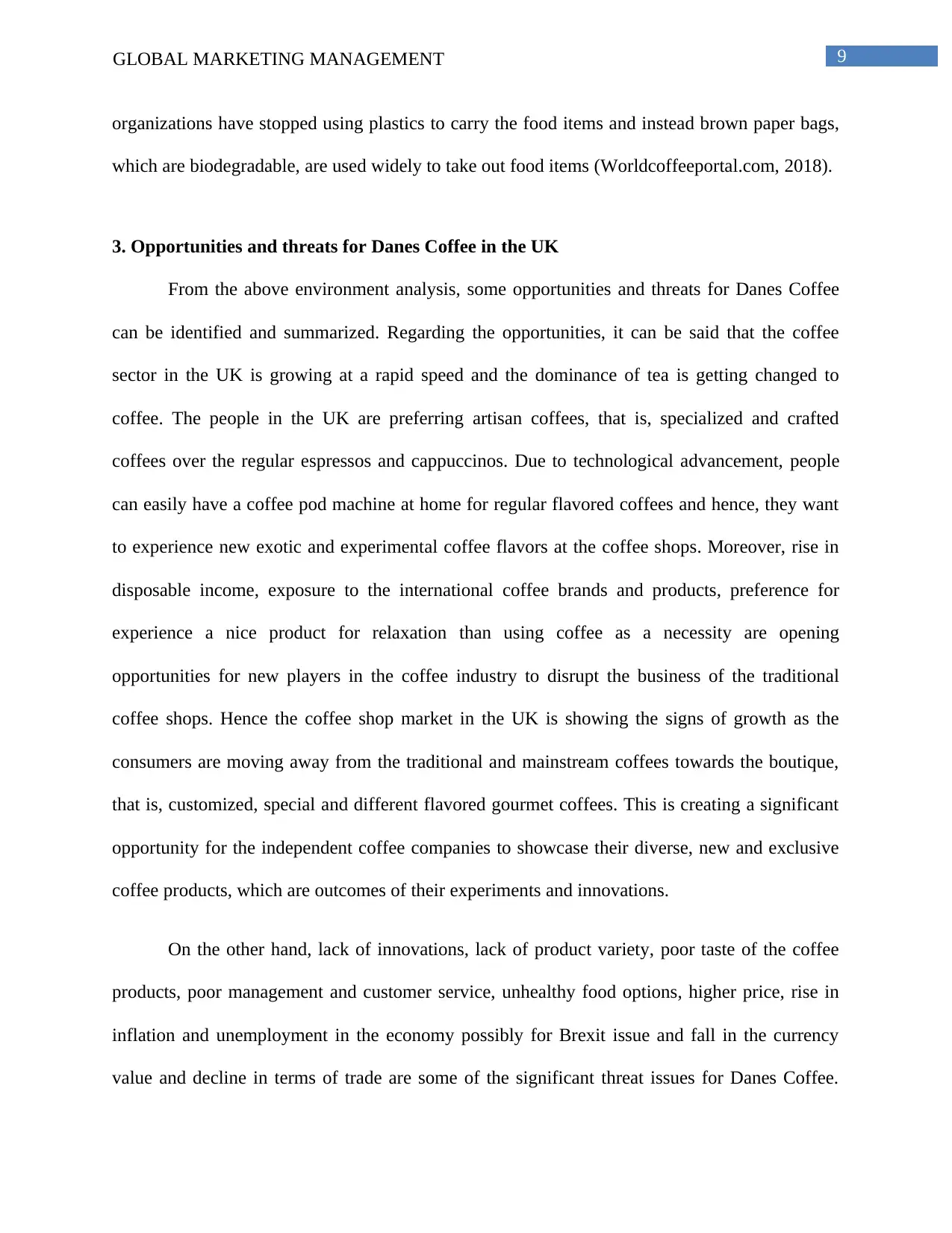
9GLOBAL MARKETING MANAGEMENT
organizations have stopped using plastics to carry the food items and instead brown paper bags,
which are biodegradable, are used widely to take out food items (Worldcoffeeportal.com, 2018).
3. Opportunities and threats for Danes Coffee in the UK
From the above environment analysis, some opportunities and threats for Danes Coffee
can be identified and summarized. Regarding the opportunities, it can be said that the coffee
sector in the UK is growing at a rapid speed and the dominance of tea is getting changed to
coffee. The people in the UK are preferring artisan coffees, that is, specialized and crafted
coffees over the regular espressos and cappuccinos. Due to technological advancement, people
can easily have a coffee pod machine at home for regular flavored coffees and hence, they want
to experience new exotic and experimental coffee flavors at the coffee shops. Moreover, rise in
disposable income, exposure to the international coffee brands and products, preference for
experience a nice product for relaxation than using coffee as a necessity are opening
opportunities for new players in the coffee industry to disrupt the business of the traditional
coffee shops. Hence the coffee shop market in the UK is showing the signs of growth as the
consumers are moving away from the traditional and mainstream coffees towards the boutique,
that is, customized, special and different flavored gourmet coffees. This is creating a significant
opportunity for the independent coffee companies to showcase their diverse, new and exclusive
coffee products, which are outcomes of their experiments and innovations.
On the other hand, lack of innovations, lack of product variety, poor taste of the coffee
products, poor management and customer service, unhealthy food options, higher price, rise in
inflation and unemployment in the economy possibly for Brexit issue and fall in the currency
value and decline in terms of trade are some of the significant threat issues for Danes Coffee.
organizations have stopped using plastics to carry the food items and instead brown paper bags,
which are biodegradable, are used widely to take out food items (Worldcoffeeportal.com, 2018).
3. Opportunities and threats for Danes Coffee in the UK
From the above environment analysis, some opportunities and threats for Danes Coffee
can be identified and summarized. Regarding the opportunities, it can be said that the coffee
sector in the UK is growing at a rapid speed and the dominance of tea is getting changed to
coffee. The people in the UK are preferring artisan coffees, that is, specialized and crafted
coffees over the regular espressos and cappuccinos. Due to technological advancement, people
can easily have a coffee pod machine at home for regular flavored coffees and hence, they want
to experience new exotic and experimental coffee flavors at the coffee shops. Moreover, rise in
disposable income, exposure to the international coffee brands and products, preference for
experience a nice product for relaxation than using coffee as a necessity are opening
opportunities for new players in the coffee industry to disrupt the business of the traditional
coffee shops. Hence the coffee shop market in the UK is showing the signs of growth as the
consumers are moving away from the traditional and mainstream coffees towards the boutique,
that is, customized, special and different flavored gourmet coffees. This is creating a significant
opportunity for the independent coffee companies to showcase their diverse, new and exclusive
coffee products, which are outcomes of their experiments and innovations.
On the other hand, lack of innovations, lack of product variety, poor taste of the coffee
products, poor management and customer service, unhealthy food options, higher price, rise in
inflation and unemployment in the economy possibly for Brexit issue and fall in the currency
value and decline in terms of trade are some of the significant threat issues for Danes Coffee.
Paraphrase This Document
Need a fresh take? Get an instant paraphrase of this document with our AI Paraphraser
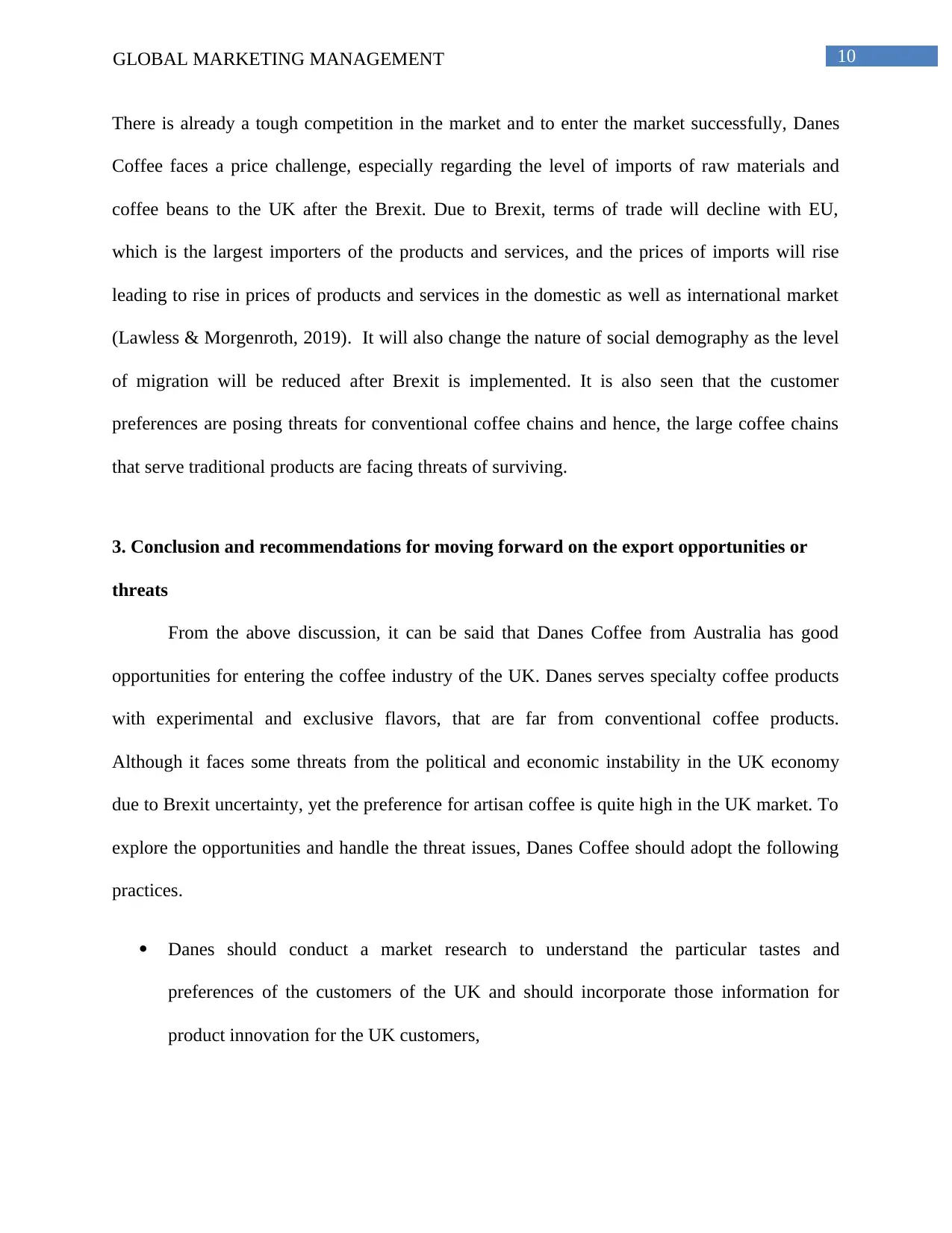
10GLOBAL MARKETING MANAGEMENT
There is already a tough competition in the market and to enter the market successfully, Danes
Coffee faces a price challenge, especially regarding the level of imports of raw materials and
coffee beans to the UK after the Brexit. Due to Brexit, terms of trade will decline with EU,
which is the largest importers of the products and services, and the prices of imports will rise
leading to rise in prices of products and services in the domestic as well as international market
(Lawless & Morgenroth, 2019). It will also change the nature of social demography as the level
of migration will be reduced after Brexit is implemented. It is also seen that the customer
preferences are posing threats for conventional coffee chains and hence, the large coffee chains
that serve traditional products are facing threats of surviving.
3. Conclusion and recommendations for moving forward on the export opportunities or
threats
From the above discussion, it can be said that Danes Coffee from Australia has good
opportunities for entering the coffee industry of the UK. Danes serves specialty coffee products
with experimental and exclusive flavors, that are far from conventional coffee products.
Although it faces some threats from the political and economic instability in the UK economy
due to Brexit uncertainty, yet the preference for artisan coffee is quite high in the UK market. To
explore the opportunities and handle the threat issues, Danes Coffee should adopt the following
practices.
Danes should conduct a market research to understand the particular tastes and
preferences of the customers of the UK and should incorporate those information for
product innovation for the UK customers,
There is already a tough competition in the market and to enter the market successfully, Danes
Coffee faces a price challenge, especially regarding the level of imports of raw materials and
coffee beans to the UK after the Brexit. Due to Brexit, terms of trade will decline with EU,
which is the largest importers of the products and services, and the prices of imports will rise
leading to rise in prices of products and services in the domestic as well as international market
(Lawless & Morgenroth, 2019). It will also change the nature of social demography as the level
of migration will be reduced after Brexit is implemented. It is also seen that the customer
preferences are posing threats for conventional coffee chains and hence, the large coffee chains
that serve traditional products are facing threats of surviving.
3. Conclusion and recommendations for moving forward on the export opportunities or
threats
From the above discussion, it can be said that Danes Coffee from Australia has good
opportunities for entering the coffee industry of the UK. Danes serves specialty coffee products
with experimental and exclusive flavors, that are far from conventional coffee products.
Although it faces some threats from the political and economic instability in the UK economy
due to Brexit uncertainty, yet the preference for artisan coffee is quite high in the UK market. To
explore the opportunities and handle the threat issues, Danes Coffee should adopt the following
practices.
Danes should conduct a market research to understand the particular tastes and
preferences of the customers of the UK and should incorporate those information for
product innovation for the UK customers,
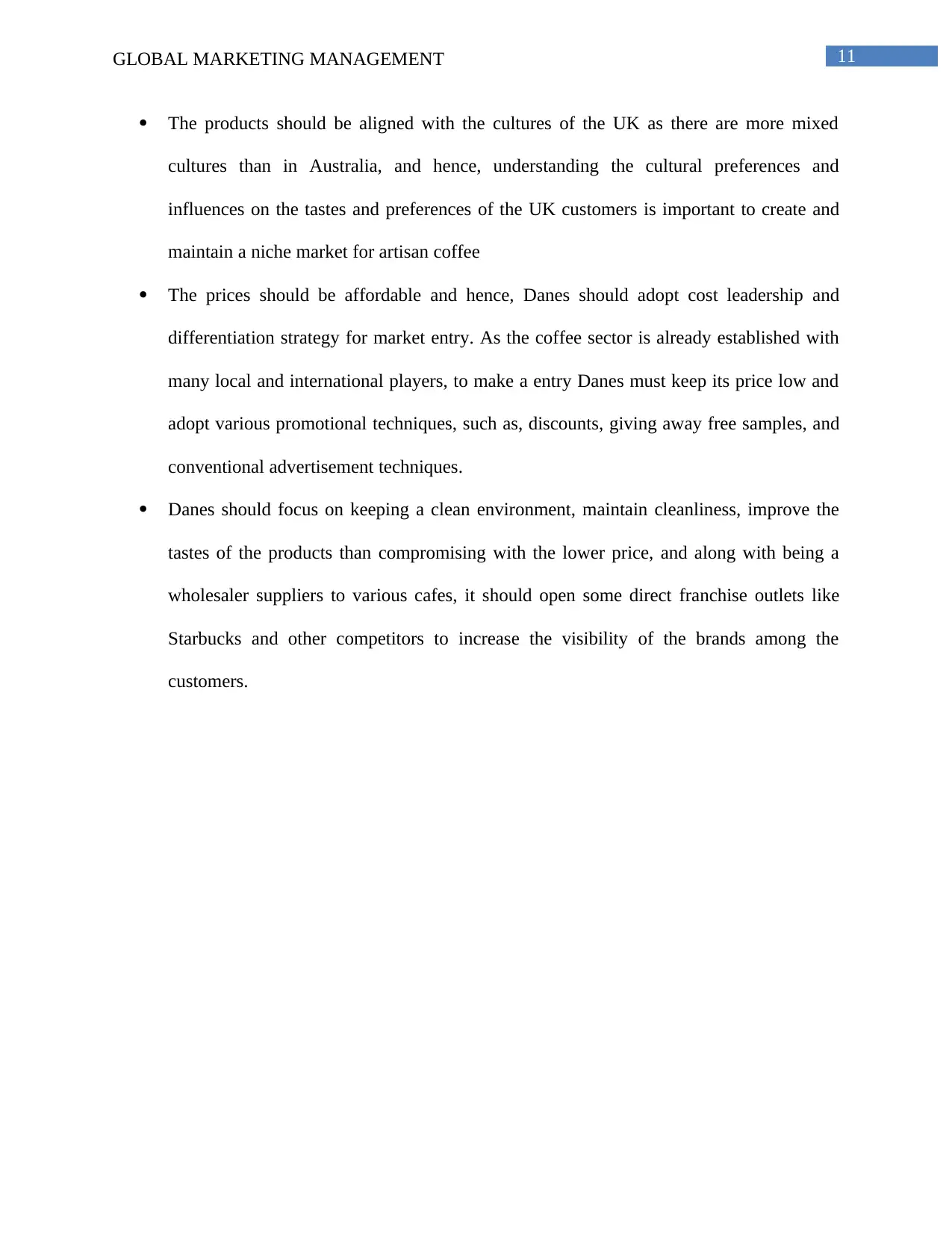
11GLOBAL MARKETING MANAGEMENT
The products should be aligned with the cultures of the UK as there are more mixed
cultures than in Australia, and hence, understanding the cultural preferences and
influences on the tastes and preferences of the UK customers is important to create and
maintain a niche market for artisan coffee
The prices should be affordable and hence, Danes should adopt cost leadership and
differentiation strategy for market entry. As the coffee sector is already established with
many local and international players, to make a entry Danes must keep its price low and
adopt various promotional techniques, such as, discounts, giving away free samples, and
conventional advertisement techniques.
Danes should focus on keeping a clean environment, maintain cleanliness, improve the
tastes of the products than compromising with the lower price, and along with being a
wholesaler suppliers to various cafes, it should open some direct franchise outlets like
Starbucks and other competitors to increase the visibility of the brands among the
customers.
The products should be aligned with the cultures of the UK as there are more mixed
cultures than in Australia, and hence, understanding the cultural preferences and
influences on the tastes and preferences of the UK customers is important to create and
maintain a niche market for artisan coffee
The prices should be affordable and hence, Danes should adopt cost leadership and
differentiation strategy for market entry. As the coffee sector is already established with
many local and international players, to make a entry Danes must keep its price low and
adopt various promotional techniques, such as, discounts, giving away free samples, and
conventional advertisement techniques.
Danes should focus on keeping a clean environment, maintain cleanliness, improve the
tastes of the products than compromising with the lower price, and along with being a
wholesaler suppliers to various cafes, it should open some direct franchise outlets like
Starbucks and other competitors to increase the visibility of the brands among the
customers.
⊘ This is a preview!⊘
Do you want full access?
Subscribe today to unlock all pages.

Trusted by 1+ million students worldwide
1 out of 15
Your All-in-One AI-Powered Toolkit for Academic Success.
+13062052269
info@desklib.com
Available 24*7 on WhatsApp / Email
![[object Object]](/_next/static/media/star-bottom.7253800d.svg)
Unlock your academic potential
Copyright © 2020–2026 A2Z Services. All Rights Reserved. Developed and managed by ZUCOL.